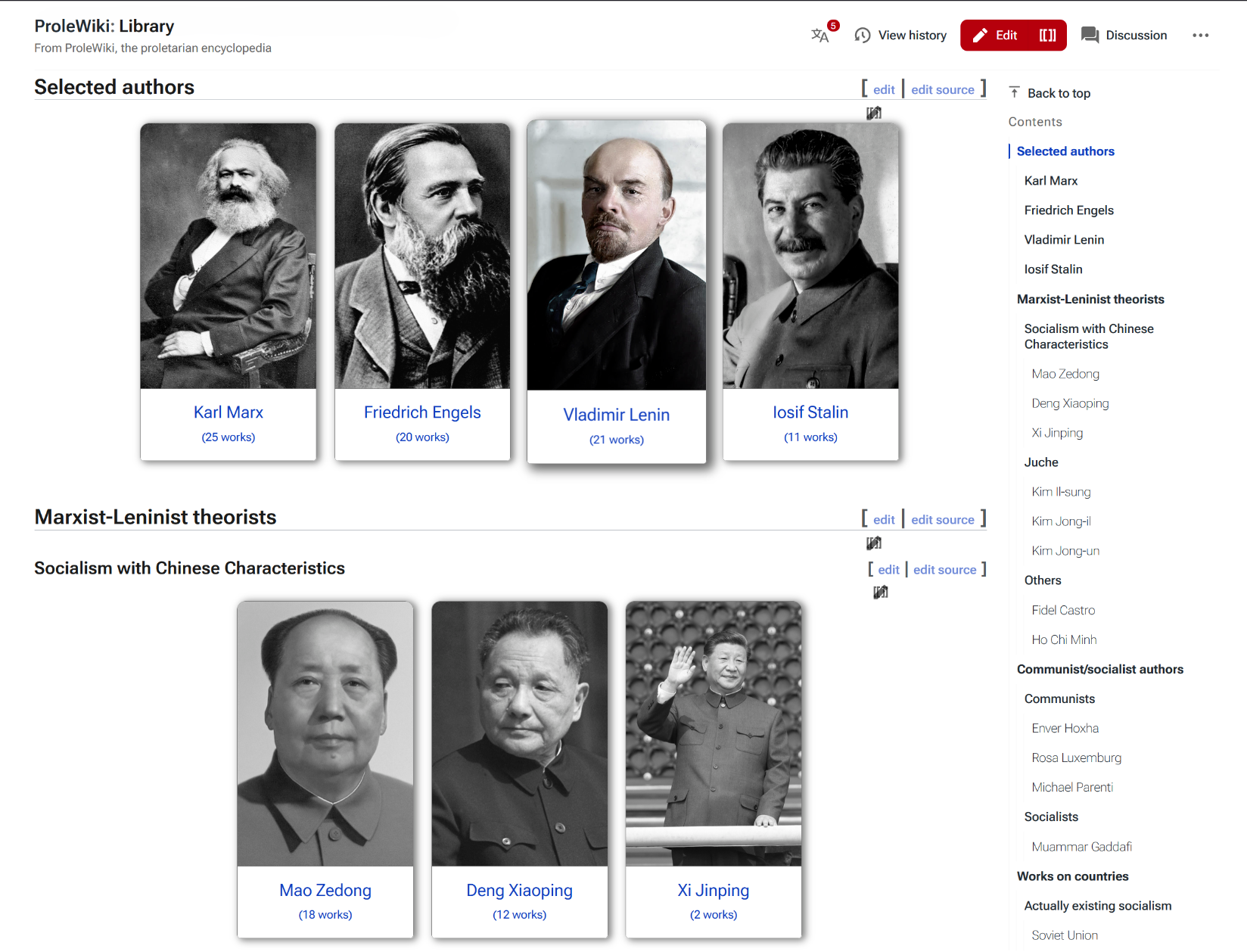Hey, all!
For over a month, I've been spending a lot of my free time creating this list of theory. The impetus for this project came from two things: first, this post by @[email protected] titled "I wish we had a hexbear wiki compendium of good books on 20th and 19th century historical topics" which set the idea in motion in the background of my mind; and second, the desire to expand the currently very small geopolitical reading list in the news megathreads. Initially, I focussed only on books directly to do with imperialism and current-day politics and geopolitics. Naturally, these events required context, so I expanded the list to include more of the 20th century. Then, I realised more nation-focus works would be necessary, and more communist theory, and it kept growing into... this. I have gone through almost every post in c/literature and c/history, looked through a significant chunk of lemmygrad and prolewiki, and gone through the bibliographies and references of several significant works (such as Prashad’s The Poorer Nations and The Darker Nations).
I haven’t the time nor energy to search every nook and cranny of the internet, so it is absolutely guaranteed that I have missed a lot of books. I am certain that this list isn’t even halfway complete - it’s more of a prototype right now. But it still has hundreds of books on it, categorized into many different sections.
Ideally all these books would be written by communists, left-wingers, anti-imperialists, and so on - or at least, are written in a style sympathetic to that position. For the purpose of anti-sectarianism, the works of major ideological positions should be fully featured. This obviously means that this is not going to be a reading list where there’s a consistent ideological position which unifies it - authors on this list are going to disagree with each other, and sometimes very harshly. Personally, I also don’t want this list to devolve into shitflinging between different authors on why X left ideology/state/project is good/perfect/materialist/idealistic/bad/flawed/evil, though I think more constructive criticism should be allowed.
Unfortunately, for more obscure events and countries, non-leftists are sometimes the only ones who have written much on them, and so we must resort to them.
Books are usually listed here with their initial publication date. This is not a recommendation that you get that particular version of the book if there are newer editions - you should of course purchase the most recent one - but a) I think it’s best to know when the book was initially conceived of and written so that we know the context of when the information was being conveyed, regardless of newer editions that may add more information, and b) I don’t want to trawl for new editions of these books every so often to update the year numbers. Additionally, books are generally listed in order of publication date. If a subsection accrues many books that fit under that category but span a lot of topics or a large time period, then a new subsection will be created and the books re-categorized.
Want To Help?
Be sure to recommend any books (or, even better, entire reading lists) that I have missed. People in my life tell me that I have a profound ability to miss the obvious, so a massively important book that every communist has heard of and read not being here should not be interpreted as a sign that I’ve deemed it not worthy - I might have just forgotten it. Just as importantly, be sure to recommend that any book be dropped - a book being here should not be interpreted as a sign that I’ve necessarily deemed it worthy. I cast a very wide net.
When recommending books, I advise four criteria:
-
Non-fiction books only. I might consider eventually putting in a historical fiction and alternative histories section, but not right now.
-
Not written by a chud, unless the point of recommending the book is to illustrate how important chuds conceive of the world, such as pieces on American strategy written by people high-up in the state - or if there is literally no other choice (military matters tend to attract chuds, for example).
-
Not too much detail, too far in the past. It would be silly to say that the Assyrians or the Romans or the Mongols haven’t had a large impact on the current world, so books on those topics are fine, but ideally they should be pretty general, and we shouldn’t have a biography for every Roman Emperor or anything like that. The period that I am most focussing on is the 21st, 20th, and 19th centuries, as that’s the best bang for your buck in terms of political understanding of the current state of affairs. This should be as efficient a reading list as possible - reading a lot is hard and life is tiring, and getting lost in the weeds of Cyrus the Great’s military campaigns isn’t helpful if you’re trying to get a grip on the current Middle East.
-
Related to politics and/or history somehow. This is the loosest of the four criteria, and I don’t really want to be arguing about whether a book on how to care for succulents, or a book on pencil manufacturing, or a book on deep sea creatures, deserve to be on the reading list. If you can argue that it belongs, then, sure, I’ll put it on.
Version 1.0 (that is, the very first version):
Added, uh, the whole reading list.
A ton of thanks to @[email protected] for letting me know about the Chunka Luta reading list. Also thanks to @[email protected] for their party's book repository.
Version 1.1:
Added dozens more recommended books, spread out across the list, notably including more books for Japan.
Added an Indigenous Theory section and reorganized some books into it.
Added a Science section and added some books to it.
Expanded "Philosophy" into "Philosophy and Theology" and added some books to the Theology section.
Added a Multi-Region section in the Regional Histories section, due to some odd books that cover multiple continents.
Apparently I forgot Finland existed, so that now has a section, and a book.
I have been recommended a few reading lists, some of which will take me a long while to get through. Nonetheless, if you have more books to add, then continue to recommend them!


 i think this is an interesting perspective, as state role do be underdeveloped
i think this is an interesting perspective, as state role do be underdeveloped